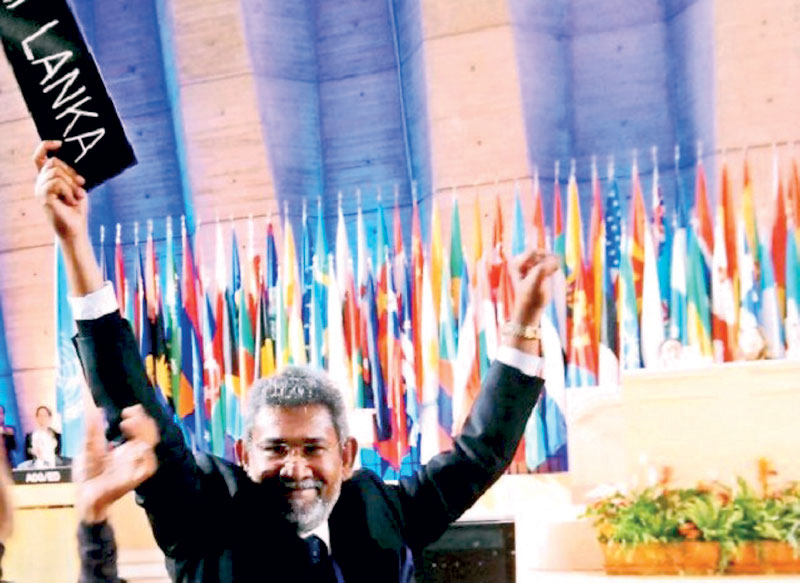Saturday Feb 21, 2026
Saturday Feb 21, 2026
Monday, 8 September 2025 00:58 - - {{hitsCtrl.values.hits}}

Dayan Jayatilleka today remains one of Sri Lanka’s sharpest political minds
 Sri Lanka’s only victory at Geneva was delivered by Dayan Jayatilleka. Six weeks later, he was removed under foreign pressure. Since then, Sri Lanka has never won again. The West tried to choke Sri Lanka with false accusations of war crimes. Dayan stopped them. He showed that sovereignty could be defended with clarity, courage, and coalition. And then he was betrayed
Sri Lanka’s only victory at Geneva was delivered by Dayan Jayatilleka. Six weeks later, he was removed under foreign pressure. Since then, Sri Lanka has never won again. The West tried to choke Sri Lanka with false accusations of war crimes. Dayan stopped them. He showed that sovereignty could be defended with clarity, courage, and coalition. And then he was betrayed
 He gave Sri Lanka its only victory at Geneva. Six weeks later he was thrown aside. A nation that trashes its finest minds does not deserve victory — and that is why we keep losing.
He gave Sri Lanka its only victory at Geneva. Six weeks later he was thrown aside. A nation that trashes its finest minds does not deserve victory — and that is why we keep losing.
The only win
For decades, Sri Lanka has stumbled through Geneva, battered by hostile resolutions and accusations of war crimes. The UN Human Rights Council became a courtroom, and Sri Lanka its permanent defendant.
Except once.
In May 2009, days after the guns fell silent, Sri Lanka entered Geneva facing certain condemnation. Western powers were prepared to brand the military victory as a crime. Instead, Sri Lanka walked out with its first and only outright diplomatic triumph. The Council passed a resolution praising the defeat of terrorism and pledging support for reconstruction.
That reversal did not come from ministries in Colombo or from scripted bureaucrats. It came from one man — Dr. Dayan Jayatilleka, Sri Lanka’s Permanent Representative in Geneva — who refused to follow the script of surrender.
The strategy that worked
Dayan understood that Geneva was not about facts alone. It was about framing, alliances, and conviction.
He reframed Sri Lanka’s struggle as a Global South cause. He warned Asia, Africa, and Latin America that if Sri Lanka could be punished for defeating terrorism, any one of them could be next. In doing so, he transformed isolation into solidarity.
He built coalitions across continents. Russia, China, Pakistan, Cuba, Venezuela, and blocs of African states rallied. Not as a favour, but because he persuaded them that defending Sri Lanka meant defending the principle of sovereignty itself.
He changed the language of diplomacy. Gone were the apologetic tones of earlier delegations. He spoke of sovereignty, non-interference, terrorism, and double standards. He reminded Geneva that powers which had waged wars from Iraq to Afghanistan had no moral authority to judge a small island that had fought for its survival.
And he did the groundwork. Long before the vote, he lobbied, hosted, and secured commitments. By the time the Western resolution came to the floor, the numbers were already aligned against it.
The result was extraordinary. A Western attempt to censure Sri Lanka collapsed, and in its place stood a resolution applauding it. For the first and only time, Geneva belonged to Sri Lanka.
The betrayal
Six weeks later, Dayan Jayatilleka was removed.
These are the kinds of decisions that are not recorded in official files and not spoken of in public. But when we turn back, we see how they shaped our past — and the public must know.
In Tel Aviv, Israeli foreign minister Tzipi Livni had raised his removal with a Sri Lankan delegation. Soon after, the Israeli ambassador in Delhi came to Colombo and pressed that he be recalled. The reason was blunt. During the 2008–2009 Gaza assault, Dayan had spoken out fiercely in Geneva and supported a resolution censuring Israel. Tel Aviv did not forgive.
Thus the diplomat who had delivered two rare victories in Geneva — one for Sri Lanka and one against Israel — was targeted. At home, powerful circles were already uneasy with his strong sovereignty language and his stance on the 13th Amendment. External pressure gave them the excuse they needed.
And so, immediately after completing the war effort on the battlefield of diplomacy, the only strategist who proved Sri Lanka could win was discarded.
The price of cowardice
From that moment, Geneva reverted to a stage of surrender.
Governments changed, but the posture remained. From Rajapaksa to Sirisena to Gotabaya and now the NPP, Sri Lanka has arrived in Geneva like a prisoner awaiting sentence. Resolutions multiplied. Monitoring mandates expanded. NGOs gained power.
The doctrine Dayan proved in 2009 — build the Global South, fight with principle, speak with sovereignty — was buried. No new generation of nationalist diplomats was trained. No institutional doctrine was built. What could have become the foundation of sovereignty was instead erased from memory.
The price has been heavy. Year after year, Sri Lanka has bent its neck lower, while the West has tightened the rope of accusations. The one proven strategy of resistance was never institutionalised.
From strategy to commentary
Dayan Jayatilleka today remains one of Sri Lanka’s sharpest political minds. He writes, he analyses, he critiques. But he is no longer shaping State policy. That is not because he has lost his ability. It is because Sri Lanka has no place for thinkers it cannot control.
Our governance has been reduced to a system that rewards obedience over competence. It silences its strategists, sidelines its thinkers, and discards those who deliver results. The fate of Dayan became a warning: if you are independent, you will be expendable.
This is why Sri Lanka continues to lose.
The exposure
This is the truth no one wants to say aloud. Sri Lanka’s only victory at Geneva was delivered by Dayan Jayatilleka. Six weeks later, he was removed under foreign pressure. Since then, Sri Lanka has never won again.
The West tried to choke Sri Lanka with false accusations of war crimes. Dayan stopped them. He showed that sovereignty could be defended with clarity, courage, and coalition. And then he was betrayed.
That betrayal was not only of one diplomat. It was the surrender of a doctrine. It was the moment foreign capitals learned they could reach into Colombo and decide who we keep and who we discard. It was the start of a governance culture where loyalty mattered more than independence, and submission replaced sovereignty.
Sri Lanka once proved it could marshal the Global South and win. The tragedy is that it never institutionalised that victory. Dayan Jayatilleka still has the capacity for strategy. The greater question is whether Sri Lanka has the courage to use it.
(The writer is the founder of The Nationalist platform and a Sri Lankan strategist on sovereignty, governance, and geopolitical affairs.)